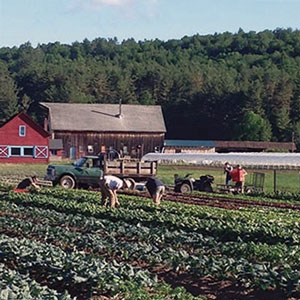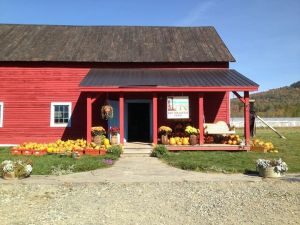
With a vast view of Franconia Ridge and Cannon Mountain across the widespread field, Ski Hearth Farm is picturesque and “sells itself”, according to farm manager David White. The historic farm house—one of the oldest structures found in the area—is a reminder of the long history of the farm property and its previous owners. Beginning with Selden Hannah’s famous potato farm in the 1940s, to Olympic Skier Bode Miller, to present-day owner Davis Mangold, Ski Hearth has been an important resource in the agricultural and agri-tourism community of the North Country. The farm’s trails are well groomed for x-country skiing!
Sugar Hill, NH 03586
By Meghan McCarthy McPhaul (April 20, 2016)
For more than 60 years, the Hannah family owned Ski Hearth Farm in Sugar Hill, raising Sel Hannah’s famous potatoes and corn, along with myriad other vegetables sold to stores throughout the area and at the popular farm stand. While it was Sel’s name on the potato bags, much of the driving force behind the farm came from his wife, Paulie, who ran a good portion of the farm show, mostly from behind the scenes. And it was their daughter Joan who managed the farm for a decade after Sel’s death, before selling it in 2002 and retiring to her gardens at the family home on a hill above Ski Hearth Farm.
The Hannahs’ story is one of early trials and lifelong triumphs, of family, of farming, and skiing. And, behind it all, two Yankee women as hardworking and practical as any you’re likely to find.
Adapting to Change
The infamous Hurricane of 1938 hit the day after Sel and Paulie Hannah bought what was then known as the Temple Farm. Fierce winds knocked down much of the timber at the farm, and the Gale River breached its banks and flooded the barnyard, eventually flowing into the basement of the Hannahs’ new home, where the year’s harvest of root vegetables (part of the sale agreement) was stored.
The newlyweds carried bushels of potatoes and beets and carrots up the stairs and into the living room, working together as they would for several decades, through many changes in the farm and in their lives. One of the first was changing the property’s name to Ski Hearth Farm, a nod to the Hannahs’ passion for skiing and their wintertime vocation of housing skiers in the farmhouse-turned-ski lodge.
One of the most difficult and lasting changes came in 1949, when Paulie, aged 32 and mother to four young children, contracted polio. She spent a year at the polio rehabilitation center in Warm Springs, Georgia, then returned home where, confined now mainly to a wheelchair, she continued to manage the farm’s operations and finances.
Pauline Lee had been raised in Wellesley, Massachusetts, in a “proper Bostonian” family. She rode horses as a girl and studied sculpture at Bennington College in Vermont. Behind the polite veneer, however, Paulie possessed a toughness she would retain throughout her life.
“She was the youngest of three girls and the tomboy,” says Joan Hannah, the eldest of four Hannah offspring. “She was a big, tough lady and stronger than the devil.”
In the first decade of Ski Hearth Farm, Paulie worked alongside Sel and the farmhands, plowing, planting 75 acres of potatoes and myriad other vegetables, loading 50-pound bags of potatoes, and driving them as far as Nashua in a truck without power steering.
“Mother was always involved with the farm. She could do the work of any man,” Joan says. “My father always said she could plow and plant straighter than any man.”
When she returned to the farm from Georgia, Paulie adapted to a new role in its operations.
“She organized what was going to be planted and where, ordered the seeds, made out all the bills, wrote out the paychecks,” says Joan. And Paulie kept detailed records of the weather, the crops planted and transplanted, when things were blooming, when they were harvested, customers, and countless other details in neatly notated diaries from 1950 through 1992, when Joan took over.
Paulie also kept tabs on farm workers. She was able to make the short walk into the yard by her house on the hill overlooking the farm and keep an eye on the happenings there. She once docked the pay of a couple of farm hands she spotted eating the cabbage they were meant to be harvesting.
From their start at the farm, Sel was involved in the ski industry, initially as a ski patroller and trail builder at nearby Cannon Mountain, and eventually founding Sno-Engineering, a ski area design company now operating as SE Group. As Sel became more involved in his ski area design work throughout New England and across the country, Paulie kept the farm running smoothly. The Hannah children – Joan, Lucy, Frank, and Sel Jr. – were expected to help from the time they were small.
“If you could lift a bale of hay, you were loading. As soon as we could reach the pedals of the tractor, we were driving,” Joan says. “I was driving a tractor by the time I was eight.”
By age 16, Joan was in charge of planting the farm’s 15 acres of corn, and she gradually took on more responsibility, including ongoing maintenance of the tractors. “If I could do it, then Dad didn’t have to do it. He could do something else.”
While her siblings had little desire to work on the farm and eventually moved away, Joan continued to be involved, even during the decades she lived far from home. During the 1960s, Joan was a member of the then purely amateur U.S. Ski Team, skiing in the 1960 and 1964 Olympics and claiming a bronze medal in the World Championship giant slalom event in 1962, the year she graced the cover of Sports Illustrated. During this time, Paulie was a key player in raising funds for the U.S. Ski Team, helping to procure $47,000 in 1964 alone.
Joan headed west in 1968, moving to Vail, Colorado, where she would spend 26 winters as a ski instructor. In 1978, she became an honored member of the U.S. Skiing Hall of Fame, a decade after her father’s induction. Despite living thousands of miles away, Joan returned to Ski Hearth Farm for a month each spring and again in the fall. “I helped plant everything, and I put everything to bed.”
When Sel died in 1991, Paulie was on a ventilator and required round-the-clock care. Joan moved back to New Hampshire and took on managing the farm, acquiring not only Sel’s duties, but many of Paulie’s as well. For a decade, Joan ran the farm, expanding on the work she’d done since she could first reach the tractor pedals.
Joan sold Ski Hearth Farm in 2002, a decision she had discussed with her mother before Paulie’s death the previous year. The farm has changed hands twice more since then, most recently when Davis Mangold purchased the property in 2013, returning Ski Hearth Farm to the bustling business it was during the long stretch the Hannahs owned it. It is fitting, perhaps, that the manager of Ski Hearth Farm is again a woman, Miriam Stason, who carries on the long tradition of women farmers here.
Joan lives in the family’s home on a rise near Ski Hearth Farm and knows what’s happening in the fields below. At age 77, she continues to grow much of what she eats. Her terraced hillside contains apple trees, rows of tomatoes and squash, broccoli and spinach, beets, basil, and several other varieties of vegetables, including, of course, potatoes.
In the summers, she plays golf, and in the winters she skis. Joan also inherited her mother’s artistic talent and continues to make and sell pottery, creating pieces that are both artful and functional – work she has done since she was a young woman. And always, her pantry is stocked amply with the things she has grown and preserved.
It all goes to show that you can take the farm-girl out of New England, but she may just return to the place her roots were planted long ago and sow some seeds of her own.
By Hannah Bolstridge (November 8, 2014)
With a vast view of Franconia Ridge and Cannon Mountain across the widespread field, Ski Hearth Farm is picturesque and “sells itself”, according to farm manager David White. The historic farm house- one of the oldest structures found in the area- is a reminder of the long history of the farm property and its previous owners. Beginning with Selden Hannah’s famous potato farm in the 1940’s, to Olympic Skier Bode Miller, to present-day owner Davis Mangold, Ski Hearth has been an important resource in the agricultural and agri-tourism community of the North Country.

Farming in the North Country alone is a major accomplishment with such a short natural growing season, but the real accomplishment is how successful Ski Hearth Farm has been in its short one-year period since Davis Mangold purchased the 600-acre property in August of 2013. Today, the organic farm is managed by David White, with the help of fifteen other employees. Ski Hearth Farm has created multiple jobs for people in the North Country- a major feat in a place where jobs are not always plentiful.
Ski Hearth Farm has a knack for tackling impressive projects seemingly without a hitch. Their current endeavor involves the creation of a ski area within the property which is anticipated to be open winter of 2015. The Nordic ski trails will reign throughout the property, with twenty kilometers of trail. While most of the farm’s revenue is brought in through CSAs and the North Country Cooperative wholesale, the recreational ski area will encourage business and publicity throughout the winter months when production and sales of CSAs and wholesale slows down. The cleared lumber also allows the farm to sell firewood.

The small window of opportunity for growing in northern New Hampshire results in the use of alternative methods to extend the growing season. Greenhouses lined with warm water piping allows seedlings to thrive enough to be transplanted into a larger area. With help of the employees and a fine-tuned harvesting system, produce can be harvested with high efficiency and then put into the cooler, comprised of thick insulated walls and a mechanically overridden, extra-chilly air conditioner.
No pesticides, GMOs, antibiotics, or other harmful chemicals are used in the production of Ski Hearth’s expansive selection of produce and eggs but the farm chooses to refrain from acquiring the organic certificate. Owner and software creator Davis Mangold has created a personalized program to keep records of their CSA market and inventory. If a question or concern arises regarding the integrity of crops or production, the personalized program offers rigid records to refer to ensuring that the farm is indeed operating in a responsible and sustainable manner. The software has allowed the farm to expand their sales to the World Wide Web- customers that prefer to shop in the comfort of their own home can place orders online and pick them up later.
Ski Hearth Farm leads by example in regards to sustainability, agri-tourism, and community outreach within the North Country of New Hampshire. For more information or inquiries, there is a direct contact form on their website.
Ski Hearth Farm
392 Streeter Pond Road
Sugar Hill, NH 03586
603-823-5560
Retail (direct to customer sales):
Farmstand & CSA
In addition to their own vegetables, meats and products from other farms are available.
